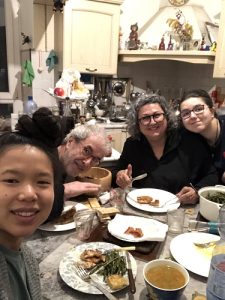Living in a Homestay: an Immersive Experience

By Umbra Rep Agnes Tessner Risser, Wellesley College
Hello, my name is Agnes Tessner Risser, and I am currently studying abroad at the Umbra Institute for the Spring 2022 Semester. I requested to live in a homestay with an Italian family in Perugia this semester, and it is the best decision that I made for my semester abroad.
I am from Hartford, Connecticut and I am a third-year student at Wellesley College in Massachusetts. I am an architecture and anthropology double major, and I chose to attend The Umbra Institute because of their Food Studies Program. I had never studied Italian language before arriving in Perugia. Usually, homestays are for students who are already proficient in Italian, but I had such a positive experience in 2021 living in a homestay in Denmark that I asked The Umbra Institute if they had any options for beginner-level students who are eager to learn. Luckily, they did, and I ended up being the only Umbra student doing a homestay this semester.

The Family
I was placed in the home of the Marziano-Danese family, who live five minutes away from the Umbra Institute. My host dad, Nino Marziano, is an artist of many disciplines and has lived in the same apartment in Perugia for his entire life. I love to hear about the change he has seen over the decades in Perugia. My host mom, Christine Danese, is an Italian-American who moved to Italy from Chicago when she was 19 years old. She started off in Italy as a bartender and is now a professional translator and language teacher. I am fortunate to have her guidance in navigating Italian language and culture from an American perspective. My host sister, Giada, is the same age as me, 21 years old, and is studying at University of Perugia to become an elementary school teacher. She’s a great friend and teacher, and like me she is very online so we often talk about pop culture. The last member of our immediate family is a very emotive cat named Boogie.
I also enjoy the random chats I’ve had with Nino’s cousin who lives downstairs. Since she doesn’t speak English, I get to put my Italian to the test. She comes upstairs to trade food with Christine and Nino. Giada and I have gone downstairs to help her sort through a mess left by her former tenant. Small moments extending a hand to extended family makes the building feel even more homely.

Everyday’s life
Since we are all busy with our own schedules throughout the day, I usually don’t see my host family until the evening. I always look forward to eating dinner with them because I never know what we’re going to talk about—family stories, travel, their local recommendations, the Italian education system, Broadway musicals— it could be anything. When I arrived, we only spoke in English, but now we start every conversation in Italian until I exhaust my vocabulary. As per the housing agreement I usually prepare my own meals but a couple times a week, Christine shares some of her delicious home cooking with me. The food disappears quickly, but Nino pours me a glass of wine and Giada offers me a dessert, and in classic Italian fashion we often talk over the table for hours.
Since I’m an anthropology student, I’ll highlight one moment that made my homestay feel not only like a home, but an anthropological experience: One Saturday I had just returned from a trip to Rome, and was describing it to my host family. My friends and I had stopped in the “Roman Ghetto” (a Jewish Ghetto established in 1555) for lunch, and I was clumsily trying to explain in Italian that I thought it’s ironic that the area is so gentrified today. However, due to their different backgrounds, Nino and Christine had slightly different understandings of “gentrification.” Usually, we would have switched to English at this point in the conversation, but this time my host family launched into a debate in Italian. Google was consulted on multiple phones, and Nino tried to sneak in some of his classic puns, which Giada translated for me with a sigh. I somehow managed to follow most of the main talking points, and even get a word in here and there. The mood was serious and yet so lighthearted, and I never thought that I’d be sparking conversations about cultural understandings of gentrification in Italian within my first month in Perugia.
Some challenges
It is important to be adaptable if you choose to live in a homestay. For instance, I am usually a vegetarian, but I decided to suspend this habit when eating my host family’s food, because I did not want to miss the chance to participate in such an important part of their family culture.

I also need to be mentally prepared for an Italian “lesson” at any time of day. My host family welcomes me home from classes or weekend trips and asks how they went, so I have to be ready to describe what I did Italian, and receive constructive feedback. These lessons are really just conversations — no measuring, writing, or quizzing is involved — but I can expect to learn at least one new word or grammar structure each time.
Finally, since I do not have Umbra students as roommates in a homestay, I have had to make an extra effort to socialize, especially in the first few weeks. Living in a homestay does not make me feel excluded or separated from the non-homestay students though, and I met Umbra friends who are living solo or with only one roommate. I regularly go out with them after dinner, and even plan trips together. I have heard that many Umbra students want to make friends with locals, which is luckily already a part of my daily life.
Homestay is a great opportunity
I would highly recommend doing a homestay if you are eager to learn about Italian language and culture and are willing to extend past the comfort zone of American culture. Some of the other Umbra apartments are gorgeous, but I have never wished that I was in normal housing because the social value of having an Italian family to come home to every day is, to me, even greater.
P.S. If you are on financial aid like me, check with your home institution’s study abroad and financial aid offices to see if you can get the extra fee for the homestay included as part of your general housing package! Your home institution might cover the cost.